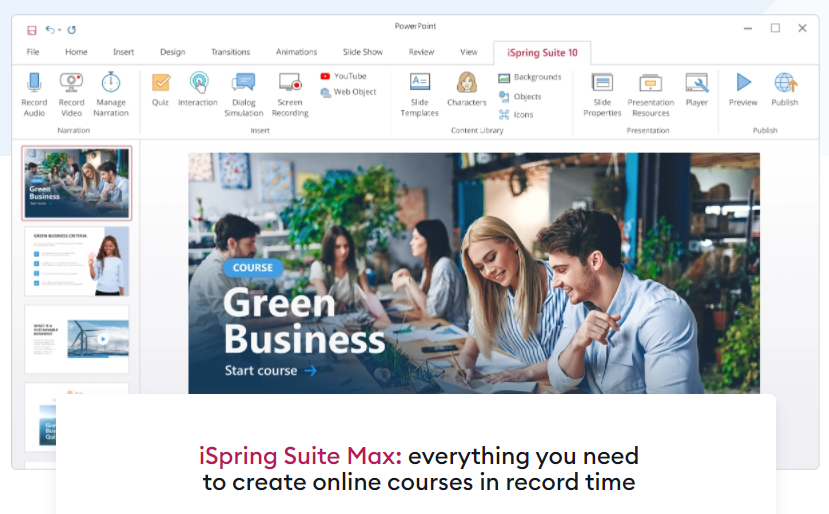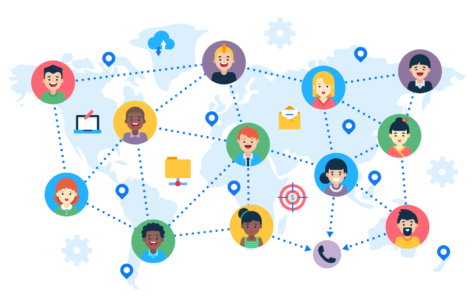Having a remote team gives a lot of benefits to your business. It is productive, cost-effective, and you also have access to top global talents.
This kind of setup also gives employees a life-work balance and reduces stress and office politics. But how can you train a team that you can’t communicate face to face?
E-learning tools are necessary for your business when training remote teams. Here are seven e-learning tools that can hopefully help train your team effectively. Each can adapt to different company strategy needs and purposes.
Authoring Tools
Authoring tools are eLearning solutions for digital content creation. It is best for companies who have a set of learning materials and training for their team.
A customized eLearning can be very effective for compliance, onboarding, and skill training. You can boost engagement with the team through tasks such as quizzes and assessments.
Video lectures and conversation simulations are particularly suitable for sales and customer service teams. Some good authoring tools are iSpring, Adobe Captivate, and Lectora Online.
iSpring Suite has a modularized, PowerPoint-like core authoring tool interface that is user-friendly to Windows users. It is also mobile-ready, adapting to all display sizes.
Adobe Captivate is available for Windows and Mac users. It supports slide presentations, quizzes, and more complex interactive games and courses. It is very suited for developing software simulations.
Lectora Online’s e-learning content is accessible to persons with hearing and visual impairment. It has no dedicated conversation simulations but has robust quizzing options and customization support such as scripts, libraries, CSS, and fonts.
Video Training
When training a remote team, there are some cases when learning should be supervised by an expert. Lessons through video streaming and conferencing tools allow learners and teachers to connect.

Zoom, GoToMeeting, Skype, and JoinMe are good e-learning tools for online classroom-like sessions. It allows engagement through question and answers and screen-sharing.
It also has recording functions that allow absent employees to catch up in their own time. Note that these tools are also great for meetings and everyday team communications.
Learning Management System (LMS)
Due to software development companies, you can get LMS tailored according to your specific needs. It is a tool where employees can learn, interact, and test their skills and knowledge while receiving valuable feedback.
TalentLMS and eFront are systems that may be good as starting picks. TalentLMS is cloud-based, while eFront is a private-hosting system. They have web conferencing, automated features, and reports that help streamline your training process. Edmodo is also efficient with its more social features and online resources.
Online learning platforms are also an avenue where learners can access multiple courses and knowledge. Coursera, Udemy, Skillshare, and Lynda are good examples of popular online skill learning platforms.
These platforms can help your team brush up on needed skills and boost their knowledge on specific topics. Consider this learning tool for your team if your company does not have suitable learning materials, training staff, or a good set training path process yet.
Learning Experience Platforms (LXP)
These eLearning tools are suitable for skill enhancements and review. It is an interactive learning platform that integrates social collaboration and gamification features.
Employees will have access to different learning paths set by the company and have personalized hubs for feedback and progress. It is a relatively new method of training that makes content fun to consume. Examples of LXPs software are EdCast and Pathgather.
EdCast, on the other hand, is an AI-driven cloud system. It has built-in analytics for performance improvement, skill-building, and career mobility.
Pathgather can integrate with many LMS and HR systems. It uses social learning features that make it fun and engaging.
Microlearning
This eLearning tool is best for onboarding. Microlearning platforms are interactive tools for bite-sized content.
It is especially effective in improving product and technical knowledge. It makes content creation easy and engaging while being extremely flexible.
What is great about it is it allows employees to learn in their own time. Software like TalentCards, Gnowbe, and Axonify is great microlearning platforms that you can try.
TalentCards works using a mobile device. It allows trainers to create micro courses and information while learners can also access it on the go.
Axonify is an AI-powered microlearning platform with a more personalized interface. It supports information reinforcement and is suitable for frontline employee training and communication.
Gnowbe is enterprise-ready and has full development features that support content creation and turnkey courses. It has multiple learning and engagement options and gamification suitable for different training needs.
Conclusion
The most effective tool for remote work depends on your team’s personality and dynamics. A reliable and effective software should be user-friendly as it helps give positive results in the least amount of time.
It should also be cost-effective and relevant to your current needs. Learning materials should also be up-to-date and relevant. Lastly, it is crucial to have reliable staff and metrics in tracking the overall team progress.
